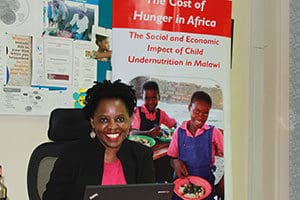Meet One of Malawi’s Top Nutritionists
Mutinta Hambayi works for WFP in Malawi. Here she talks about her work as a nutritionist, some of the biggest misconceptions about her job and what she finds most rewarding about her job.
My role includes…
heading a Nutrition Unit with a diverse Nutrition and HIV portfolio in a large operation in Malawi, reaching 2.8 million people this year. I double up as Project Manager for research on prevention of stunting, which is a partnership with the Children Investment Fund Foundation (CIFF). I am also the chairperson of the Donor nutrition security group (Donuts), a consortium of 14 UN and development partners.
 The most common misconception about my job is…
The most common misconception about my job is…
that nutrition, or the work around it, is only treating a disease, namely malnutrition.
The thing that it would be most helpful for others to understand about my job is…
that good nutrition is the foundation for an individual, a nation rich or poor and for economic growth. Nutrition is a bed-rock of human well-being, the ultimate realization of Zero Hunger. I see an entry point in everything everyone does because nutrition is a “harmonizing” area. All avenues of WFP programming must have explicit nutrition objectives.
A highlight during my time at WFP was…
by far in Sudan. I was thrown into the deep end of addressing an emergency – the aftermath of the Bahr Gazal war in 2000. You had to think on your toes. I had never seen so many severely malnourished children – it was a whole camp, it was heartbreaking. Fast forward, professionally I currently lead a cutting edge nutrition pilot on stunting.
The most rewarding part of my job is…
simply being a nutritionist in WFP and being able to contribute through an organization that reaches millions of vulnerable people. It feels like such a good fit for me.
The most frustrating part of my job is…
sometimes having little time to “think” and time for brain space. Sometimes I worry that I am just reacting and not applying a thought process for effective and lasting results. There are emerging issues of climate change, urbanization, resilience, social protection and so on which I must take on board for nutrition. As a technical advisor, I must see how my recommendations have far-reaching implications.
The main attributes you need for this job are…
adaptability and personal skills. Nutrition requires that you engage with many players. Of course you need technical competence and to be strategic in thinking, so that you can see and debate for a bigger and better picture – we can’t do nutrition alone.
The advice I’d give someone interested in this type of work is…
nutrition is at a crossroads, for better or for worse. The opportunity to make good is now, when nutrition enjoys a high and unprecedented level of attention globally and within WFP.
Learn more about WFP’s work with maternal and child nutrition.




